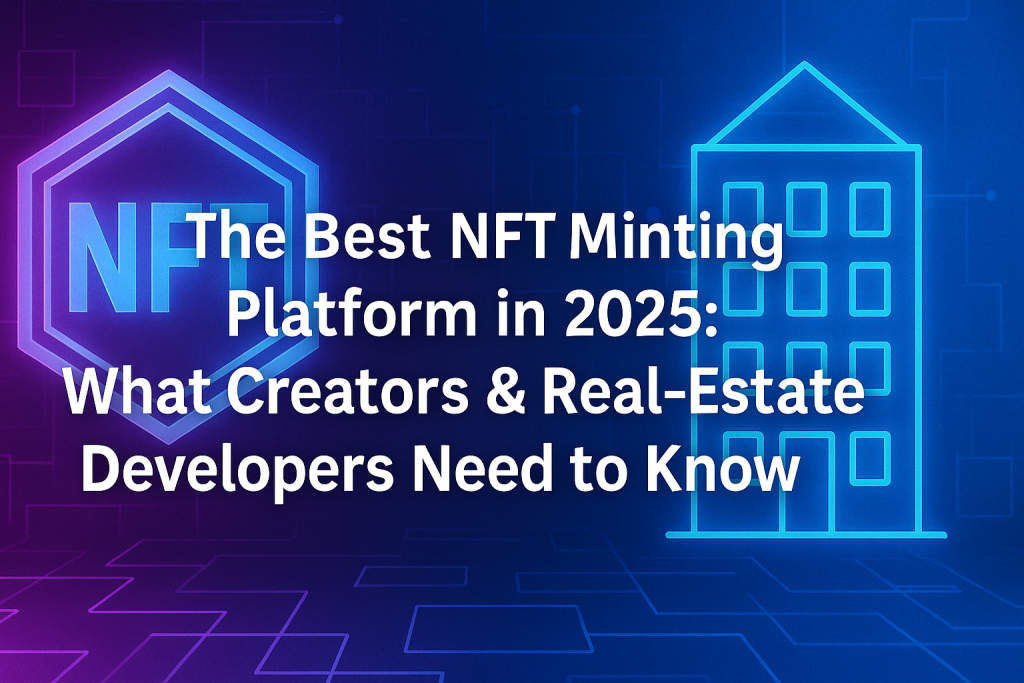

The UAE’s real estate market has long attracted investors, both locally and globally. This is due to its dynamic growth, modern infrastructure, and favorable investment climate. One of the key vehicles for investors looking to gain exposure to the real estate market without buying physical properties is through Real Estate Investment Trusts (REITs). REIT in comparison with crowdfunding in the UAE real estate sector has got advantages and disadvantages. Recently, the incorporation of blockchain technology into the operations of REITs has begun to transform how these investment vehicles function, increasing their accessibility, transparency, and efficiency.
Are RWAs a hedge against volatility?
In an era of economic uncertainty, Real-World Assets (RWAs) offer a reliable solution for investors seeking stability. By tokenising tangible assets such as fine art, real estate, or rare collectibles, RWAs provide a unique blend of… pic.twitter.com/G7oKAHKx5r
— Galileo Protocol (@galileoprotocol) January 20, 2025
This article delves into the growing role of blockchain in UAE’s REITs and how it is reshaping the investment landscape.
Understanding Blockchain and REITs in the UAE
What Are Real Estate Investment Trusts (REITs)?
REITs are companies that own, operate, or finance income-producing real estate. They offer investors the opportunity to invest in real estate assets through shares on a public exchange. That would be providing a more liquid and accessible alternative to direct property ownership. REITs in the UAE have gained popularity in recent years, with investors seeking diversified portfolios and stable returns from real estate assets without the need to manage properties directly.
The Power of Blockchain Technology
Blockchain is a decentralized digital ledger technology. It records transactions across multiple computers, ensuring the security, transparency, and immutability of data. It eliminates the need for intermediaries and streamlines processes, making transactions faster, cheaper, and more secure. When applied to REITs, blockchain can address key challenges such as transparency, liquidity, and efficiency, while offering new opportunities for investors and real estate companies alike.
How Blockchain Is Enhancing UAE’s REITs

1. Increased Transparency and Trust in Transactions
One of the core challenges in traditional REIT operations is the lack of transparency in transactions. Investors often rely on the information provided by the management of the REIT. In some cases, discrepancies or delays in reporting can undermine trust. Blockchain resolves this issue by providing a transparent, immutable record of all transactions.
Blockchain records every transaction related to REIT assets. Hence, investors can independently verify all data related to their investments in real-time. Blockchain’s transparency ensures that asset management, distributions, and ownership transfers are visible and traceable, increasing investor confidence and reducing the risk of fraud or mismanagement.
Key Benefits:
- Transparency in Transactions: Blockchain records every transaction, making the entire process more transparent and verifiable for investors.
- Reduced Fraud Risk: With decentralized ledgers, the chances of fraud are minimized. This is because every transaction is immutable and cannot be altered once recorded.
2. Enhanced Liquidity and Faster Transactions
Liquidity is often a challenge for traditional real estate investments, especially for assets held within a REIT. Blockchain technology allows for the tokenization of real estate assets, enabling fractional ownership through digital tokens. These tokens can be traded on blockchain platforms. This will be providing a way for investors to buy, sell, and trade their shares in the REIT with much greater flexibility and speed compared to traditional methods.
The tokenization of REIT shares means that investors can easily trade their investments, even in smaller portions, without waiting for lengthy settlement periods. This creates a more dynamic and liquid market for REITs, allowing both institutional and retail investors to enter and exit the market quickly.
Key Benefits:
- Tokenization of Assets: Real estate assets within REITs can be tokenized, enabling fractional ownership and improving liquidity.
- Fast, Secure Transactions: Blockchain reduces settlement times, allowing investors to transact more quickly and efficiently.
3. Cost Reduction and Efficiency Gains
Blockchain technology is also helping to streamline operations within REITs by reducing administrative costs and eliminating intermediaries. Traditional REITs rely on several third parties, such as banks, brokers, and legal firms, to process transactions, verify documents, and handle distribution. These intermediaries can slow down processes and increase costs.
Blockchain cuts out the need for many of these intermediaries by automating processes through smart contracts. Smart contracts automatically execute predefined actions when certain conditions are met. That would reduce the need for manual oversight and increasing operational efficiency. For example, once a payment is made to a REIT, a smart contract could automatically trigger the distribution of dividends to shareholders. This will be reducing the administrative burden and minimizing errors.
Key Benefits:
- Reduced Operational Costs: Blockchain automates processes, reducing the need for intermediaries and lowering transaction fees.
- Operational Efficiency: Smart contracts automate actions and reduce manual intervention, speeding up processes and ensuring accuracy.
4. Broader Access for Global Investors
Historically, investing in UAE-based REITs was limited to local or regional investors due to regulatory barriers and currency restrictions. Blockchain has the potential to overcome these barriers by enabling cross-border investments using digital currencies or tokenized assets. International investors can invest in UAE REITs without the need for complex currency exchanges or navigating international banking systems.
Furthermore, blockchain allows for greater accessibility, as smaller investments can be made through tokenized shares, enabling a more diverse range of investors to participate in UAE’s real estate market. This democratization of access will likely attract foreign capital and enhance the overall growth of UAE’s real estate sector.
Key Benefits:
- Global Access to Investments: Blockchain removes geographical barriers, allowing international investors to easily invest in UAE-based REITs.
- Lower Investment Thresholds: Tokenization allows fractional ownership. That would make it easier for smaller investors to participate in the UAE real estate market.
The Future of Blockchain in UAE’s REITs
1. Regulatory Advancements and Legal Frameworks
As blockchain continues to gain traction in the UAE, the government is likely to develop clearer regulations surrounding its use in real estate investment, including REITs. With more clarity on how blockchain-based transactions will be taxed, regulated, and recognized by the authorities, blockchain could become a cornerstone of the UAE’s real estate investment landscape.
Key Trends:
- Regulatory Clarity: Governments and regulators are expected to create legal frameworks for blockchain-based real estate investments, including REITs.
- Smart Regulation: Blockchain could work in tandem with existing regulatory structures, creating a hybrid environment that ensures both innovation and investor protection.
2. Growth of Blockchain-Powered REIT Platforms
We are likely to see a rise in the development of blockchain-powered REIT platforms that allow investors to manage their portfolios, access real-time data, and make transactions in a fully digital environment. These platforms will leverage blockchain’s benefits, offering more efficient ways to invest in, trade, and track REIT shares.
Key Trends:
- Digital REIT Platforms: Blockchain platforms will offer an entirely digital experience for managing REIT investments, further streamlining the process for investors.
- Increased Integration with Global Platforms: Blockchain technology will integrate UAE REITs with international investment platforms, broadening the pool of potential investors.
Challenges of Blockchain Adoption in UAE’s REITs
While the benefits of blockchain integration into UAE’s REITs are clear, challenges remain, particularly around regulatory uncertainty, technology adoption, and market acceptance. Real estate companies and investors will need to navigate these hurdles to fully capitalize on blockchain’s potential. Besides, for foreign investors in UAE REITs a full understanding of the UAE taxation system in real estate is essential.

Key Challenges:
- Regulatory Uncertainty: Legal frameworks for blockchain-powered REITs are still developing, which may pose challenges for widespread adoption.
- Technological Barriers: The integration of blockchain technology requires significant investment in new systems and infrastructure, which may be a challenge for smaller firms.
Conclusion: Blockchain Is Shaping the Future of UAE’s REITs
Blockchain is playing an increasingly important role in transforming the UAE’s REITs, making them more transparent, efficient, and accessible to investors around the world. By enabling tokenization, reducing costs, enhancing liquidity, and ensuring greater security, blockchain is reshaping the way investors engage with real estate assets. As regulations evolve and blockchain adoption continues to grow, the UAE’s REIT market is capable for a more streamlined, inclusive, and dynamic future.
Homecubes, a licensed real estate tokenization platform focusing on Dubai real estate, has several exciting property tokenization projects in the pipeline. We encourage you to contact us for more information on our lucrative fractional investment opportunities in premium properties across Dubai.










